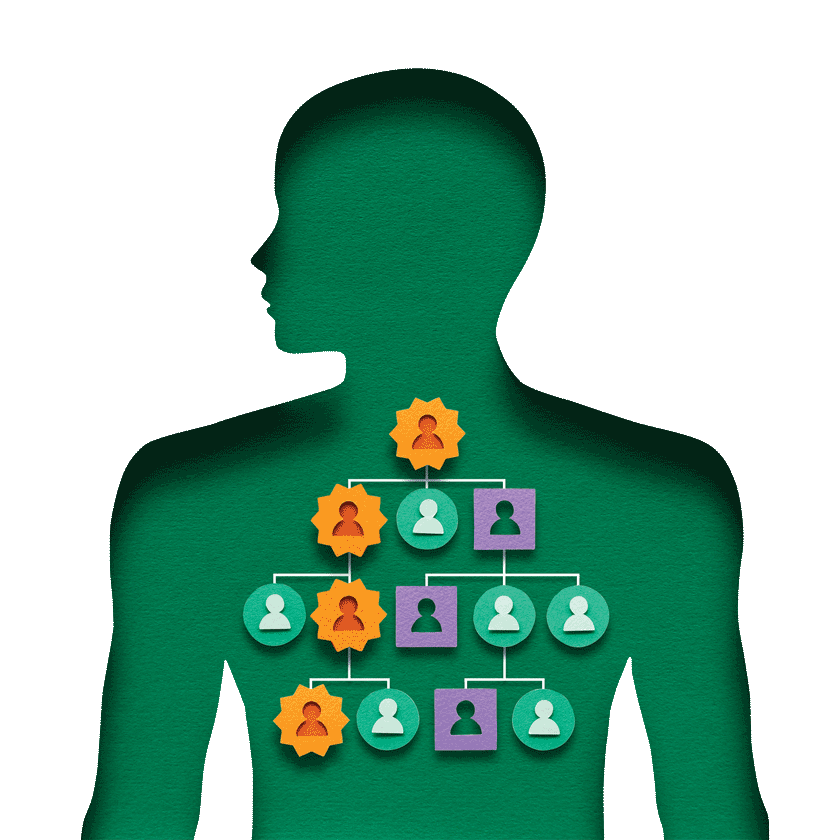Treating Cancer By Mutation, Not by Tumor Location

For some cancer patients, including some pancreatic cancer patients, the genetic makeup of their tumor makes all the difference in treatment.
On May 23, 2017, the U.S. Food and Drug Administration (FDA) granted accelerated approval to pembrolizumab, better known by its brand name Keytruda, for adult and pediatric patients with microsatellite instability-high (MSI-H) or mismatch repair deficient (dMMR) solid tumors that were not surgically removable or were metastatic. That approval meant the drug could be used to treat cancers based on their genetic characteristics rather than the specific type or location of the tumor.
Just a few years later, Keytruda was granted approval for use in tumor mutational burden-high (TMB-H) cancers. Since 2017, there have been a slew of tumor-agnostic therapy—based on the tumor mutations rather than tumor location—approvals for cancers with mutations including NTRK gene fusions, BRAF V6000E mutations, and metastatic HER2-positive solid tumors, among others.
These approvals have largely been attributed to a better understanding of driver alterations (changes in DNA that cause cells to become cancer cells) and shared biomarkers among different cancer types, explains physician–scientist Conan Kinsey, M.D., Ph.D., of the Huntsman Cancer Institute, University of Utah, in Salt Lake City, Utah. “With these (tumor agnostic) drugs, it really doesn’t matter where these tumors are located,” he says. “What matters is how they look genetically after you test a sample of tumor tissue. This is really all about providing personalized therapies to patients with tumors that have common genetic characteristics. It’s a change that can potentially provide new options for patients with hard-to-treat tumors or rare tumors. Pancreatic cancer falls into that category.”
A Challenge
One of the challenges in pancreatic cancer is that tumor-agnostic drugs currently target genetic alterations that are “very rare in an already rare cancer,” notes Kinsey, whose lab studies combining targeted therapies with autophagy inhibition in pancreatic and other gastrointestinal cancers. “But we are making some progress, and I do think precision medicine is vital in pancreas cancer treatment. This disease is not homogeneous, and we are getting better at treating individuals, which is what precision medicine is all about, whether it’s with tumor-agnostic drugs or combined approaches. At the end of the day, we need to do the research to make this happen.”
Because these mutations are rare across cancers, trials of tumor-agnostic drugs are usually done using a design called basket trials or bucket trials. Traditional cancer clinical trials typically enroll patients based on their tumor’s histologic subtype or anatomic location. Basket trials are designed to address the limitations of traditional trials by focusing solely on evaluating the effectiveness of drugs across multiple cancer types, based on the alteration of a biomarker rather than the tumor location. A basket trial allows researchers to determine how well a drug works in rare cancers that have small patient populations or treatment options that are very limited, Kinsey explains.
Recent Approvals
In the last year, several new tumor-agnostic drugs have been given the green light for pancreatic cancer treatment.
In 2024, the FDA gave accelerated approval for trastuzumab deruxtecan—also known as T-DXd (ENHERTU)—to treat anyone with any advanced solid cancer if their tumors produce high levels of the protein HER2, or HER2-positive. To receive the drug, a patient must already have received at least one prior treatment. T-DXd is already approved to treat people with several specific cancers, including breast and stomach. About one to seven percent of pancreatic cancers are HER2-positive.
HER2 is a protein that plays a role in cell growth and division. In some cancers, HER2 is overexpressed or amplified, leading to uncontrolled cell growth. While HER2 overexpression is more common in breast and gastric cancers, it has also been observed in a subset of pancreatic cancers, potentially impacting prognosis and response to treatment.
The drug has shown some efficacy in treating HER2-expressing pancreatic cancer, particularly in patients with advanced, previously treated tumors. However, the response rate specifically for pancreatic cancer in the DESTINY-PanTumor02 trial was relatively low compared to other tumor types. In the DESTINY-PanTumor02 trial, ENHERTU demonstrated an overall objective response rate (ORR) of 37.1 percent across all tumor types. However, the specific ORR for pancreatic cancer was only four percent. While the response rate for pancreatic cancer was low, the responses seen in the trial lasted an average of 11.8 months.
Also in 2024, Augtyro (repotrectinib) received accelerated approval for patients with solid tumors with NTRK gene fusions with locally advanced or metastatic disease that progressed following treatment. These fusions involve the joining of an NTRK gene with another gene, creating a protein that promotes tumor growth. The NTRK gene changes are linked to many types of cancers, including brain, lung, pancreatic, and others. However, the overall prevalence in pancreatic cancer is low, around 0.3-0.8 percent of cases. Augtyro is a tyrosine kinase inhibitor, which works by blocking signals that cause tumor cells to multiply. Blocking the signals helps to stop the spread of cancer.
And to round out the year, in December 2024, the FDA granted accelerated approval to zenocutuzumab-zbco (Bizengri) for adults with advanced, unresectable, or metastatic non-small cell lung cancer (NSCLC) or pancreatic cancer with a neuregulin 1 (NRG1) gene fusion, who had disease progression on or after prior systemic therapy. This represents the first FDA approval of a systemic therapy for patients with either type of cancer that have an NRG1 gene fusion. About three percent of patients with pancreatic cancer have an NRG1 gene fusion. Efficacy was evaluated in the eNRGy study, a multicenter, open label, multicohort trial. The trial enrolled 64 adults with advanced or metastatic NRG1 fusion-positive NSCLC and 30 adults with advanced or metastatic NRG1 fusion-positive pancreatic cancer who had disease progression following standard of care treatment. For pancreatic cancer, the objective response rate was 40 percent and the duration of response range was 3.7 months to 16.6 months.
Although it’s not being tested as a tumor-agnostic drug, a drug called RMC-6236 (daraxonrasib) offers some exciting potential in the targeting of the RAS(ON) protein, a common mutation in cancers like pancreatic, lung, and colorectal cancers. A better understanding of RAS mutations is very important since 85 to 90 percent of pancreatic cancer patients carry a KRAS mutation, which is simply a type of RAS mutation. “Though it’s technically not a tumor-agnostic drug at this point since it is being studied in specific cancers, the potential ability to target mutated RAS regardless of where it located in the body is very exciting, but we need to wait for the data,” Kinsey explains. Mutations in RAS genes occur in many cancer types.
Although none of these drugs are a “home run” in pancreatic cancer treatment and are not used in first-line treatment, the potential to offer patients more options is always “a step forward,” Kinsey says. “You have to weigh the benefits, the risks and figure out if the juice is really worth the squeeze,” he adds. “Research is ongoing, and we are going to get much better at personalizing treatment.”





